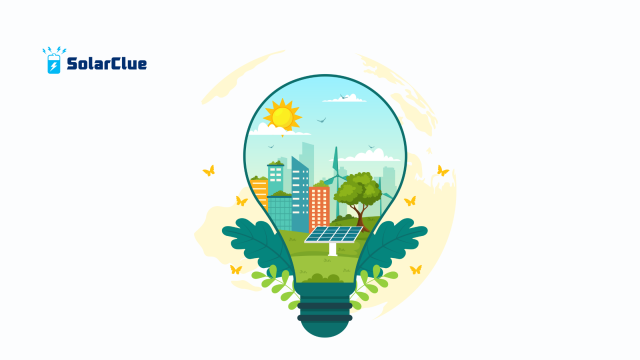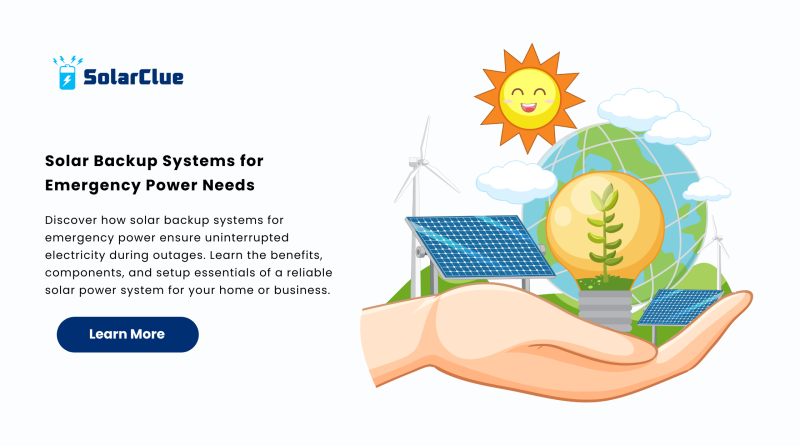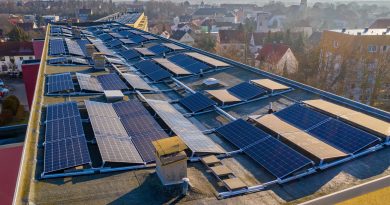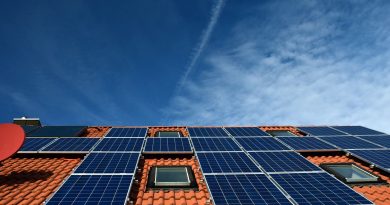Solar Backup Systems for Emergency Power Needs
With increasing power outages caused by natural disasters, grid failures, and rising electricity demand, having a dependable solar backup system for emergency power is no longer a luxury—it’s a necessity. Whether you’re a homeowner or a business, installing a solar power system equipped with backup solutions can keep your essential appliances running even when the grid is down.
These systems harness solar energy, a clean and sustainable form of renewable energy, and store it for emergency use. In this guide, we’ll walk you through everything you need to know about solar backup systems, their benefits, components, and how to choose the right setup for your needs.
Table of Contents
- 1 What Is a Solar Backup System?
- 2 Why Choose Solar Backup for Emergency Power?
- 3 Key Components of a Solar Backup System
- 4 Types of Solar Backup Systems
- 5 How to Choose the Right System
- 6 Installation & Maintenance Tips
- 7 Best Use Cases for Solar Backup Systems
- 8 Government Incentives & Support
- 9 FAQs
- 10 Conclusion
What Is a Solar Backup System?
A solar backup system is a solar power system that includes solar panels, inverters, batteries, and controllers designed to store energy during the day for use when grid power is unavailable. Unlike traditional generators, solar backups are silent, environmentally friendly, and require minimal maintenance.
These systems can power everything from lights and fans to critical devices like medical equipment, routers, refrigerators, and even some air conditioners, depending on system size.
Why Choose Solar Backup for Emergency Power?
1. Reliable Power During Outages
Whether it’s a cyclone, storm, or transformer failure, solar backup systems for emergency power offer a reliable energy source when you need it most.
2. Clean and Renewable Energy
Solar backups operate using solar energy, which is sustainable and reduces your carbon footprint compared to diesel or petrol generators.
3. Cost-Effective in the Long Run
Though the upfront cost of a solar power system may be higher, the savings on electricity bills and zero fuel costs make it an economical choice over time.
4. Noise-Free Operation
Unlike diesel generators that can be loud and disruptive, solar power systems are quiet and suitable for both urban and rural settings.
5. Low Maintenance
Solar panels and batteries require very little maintenance, especially when compared to fuel-based backup options.
Key Components of a Solar Backup System
1. Solar Panels
The heart of any solar power system, solar panels capture sunlight and convert it into usable electricity. Monocrystalline panels are often preferred for emergency systems due to their efficiency.
2. Inverter
The inverter converts the DC electricity from the solar panel into AC power, which is what your appliances use.
3. Battery Storage
Energy not immediately used is stored in batteries for later. Lithium-ion batteries are highly recommended due to their long lifespan and high performance.
4. Charge Controller
This component manages the power going into the battery bank from the solar panels to prevent overcharging and damage.
Types of Solar Backup Systems

1. Grid-Tied with Battery Backup
These systems are connected to the main utility grid but have a battery bank for backup. They’re ideal for reducing electricity bills while ensuring emergency power.
2. Off-Grid Solar Systems
Perfect for remote areas, these setups are entirely independent of the grid and rely fully on solar energy.
3. Hybrid Systems
These combine both grid and solar battery functionalities and switch between them based on availability. They offer the highest reliability and energy savings.
How to Choose the Right System
1. Determine Your Energy Needs
Make a list of appliances and estimate how much energy (in watts) they consume daily. This helps in deciding the capacity of your solar power system.
2. Consider Space Availability
Ensure your roof or open space can accommodate the required number of solar panels.
3. Choose Quality Components
Invest in reputed solar panel brands, efficient inverters, and reliable batteries. Look for warranties and certifications.
4. Budget Planning
Though initial costs can be high, government subsidies and financing options can make solar more affordable.
5. Consult an Expert
Always get your system designed and installed by certified professionals to ensure safety and optimal performance.
Installation & Maintenance Tips
-
Install panels facing south (in India) for maximum sunlight exposure.
-
Keep panels clean for better efficiency.
-
Monitor system output through apps or monitoring software.
-
Replace batteries as per their lifecycle (usually 5-10 years).
Best Use Cases for Solar Backup Systems
-
Homes: Lighting, fans, Wi-Fi, TV, refrigerators.
-
Offices: Computers, routers, emergency lighting.
-
Hospitals: Critical medical equipment, emergency lighting.
-
Shops: Billing systems, lights, refrigerators.
Government Incentives & Support
In India, the central government, under the Ministry of New and Renewable Energy (MNRE), offers subsidies for grid-connected rooftop solar systems specifically for residential consumers. These subsidies are part of the Rooftop Solar Programme Phase II and are available only when systems are installed through DISCOM-empanelled vendors. The subsidy amount varies based on system capacity and location.
Commercial and industrial users are not eligible for this subsidy scheme but may benefit through accelerated depreciation and other financial mechanisms.
FAQs
Q1. Can a solar backup system power an entire home?
Yes, depending on the system’s capacity and battery size. A properly sized solar power system with adequate storage can power an entire home during outages.
Q2. How long will a solar battery last during an outage?
It depends on usage and battery capacity. Typically, a 5kWh battery can last 6–10 hours for essential appliances.
Q3. Is solar backup better than a diesel generator?
Yes. Solar backup systems are cleaner, quieter, and more cost-effective in the long term.
Q4. What is the lifespan of a solar backup system?
Solar panels last 25+ years, while batteries usually need replacement after 5–10 years, depending on the type.
Q5. Can I add a battery to my existing solar system?
Absolutely. Hybrid inverters allow integration of battery backup to existing setups.
Conclusion
Installing a solar backup system for emergency power is a smart, future-proof investment. It not only keeps you powered during outages but also contributes to a greener planet through the use of renewable energy. From protecting your home to powering critical infrastructure, solar power systems offer unmatched reliability and long-term benefits.
Explore more about how you can switch to solar confidently by visiting www.solarclue.com or check helpful tips and guides at blog.solarclue.com — your trusted companion in India’s solar journey.




